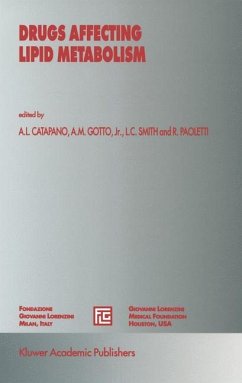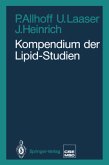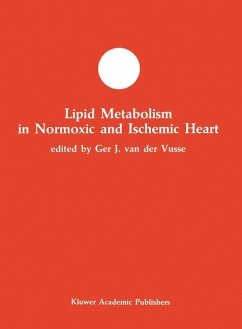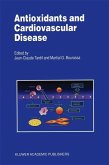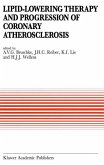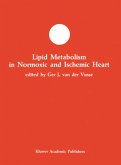Drugs Affecting Lipid Metabolism
Herausgegeben von Catapano, Alberico L.; Gotto Jr., Antonio M.; Smith, Louis C.; Paoletti, Rodolfo
Drugs Affecting Lipid Metabolism
Herausgegeben von Catapano, Alberico L.; Gotto Jr., Antonio M.; Smith, Louis C.; Paoletti, Rodolfo
- Broschiertes Buch
- Merkliste
- Auf die Merkliste
- Bewerten Bewerten
- Teilen
- Produkt teilen
- Produkterinnerung
- Produkterinnerung
A great deal of experimental, clinical and epidemiological data have been gathered to confirm the strict and causal correlation between plasma lipoproteins and coronary heart disease. However, as usually happens in research, many more interesting issues are being studied, opening new fields of research for the future. These new advances, together with the combined efforts of cell biologists and lipoprotein chemists, have set the pace for an exciting period of research and clinical applications of diets and drugs affecting plasma and cell lipids. This volume, which includes the work of many of…mehr
Andere Kunden interessierten sich auch für
![Atherosclerosis Drug Discovery Atherosclerosis Drug Discovery]() Atherosclerosis Drug Discovery41,99 €
Atherosclerosis Drug Discovery41,99 €![Kompendium der Lipid-Studien Kompendium der Lipid-Studien]() Peter AllhoffKompendium der Lipid-Studien54,99 €
Peter AllhoffKompendium der Lipid-Studien54,99 €![Lipid Metabolism in Normoxic and Ischemic Heart Lipid Metabolism in Normoxic and Ischemic Heart]() Lipid Metabolism in Normoxic and Ischemic Heart81,99 €
Lipid Metabolism in Normoxic and Ischemic Heart81,99 €![Antioxidants and Cardiovascular Disease Antioxidants and Cardiovascular Disease]() Antioxidants and Cardiovascular Disease77,99 €
Antioxidants and Cardiovascular Disease77,99 €![Lipid-Lowering Therapy and Progression of Coronary Atherosclerosis Lipid-Lowering Therapy and Progression of Coronary Atherosclerosis]() Lipid-Lowering Therapy and Progression of Coronary Atherosclerosis42,99 €
Lipid-Lowering Therapy and Progression of Coronary Atherosclerosis42,99 €![Lipid Metabolism in Normoxic and Ischemic Heart Lipid Metabolism in Normoxic and Ischemic Heart]() Ger J. van der Vusse (ed.)Lipid Metabolism in Normoxic and Ischemic Heart81,99 €
Ger J. van der Vusse (ed.)Lipid Metabolism in Normoxic and Ischemic Heart81,99 €![BASICS Molekulare Zellbiologie BASICS Molekulare Zellbiologie]() Björn JacobiBASICS Molekulare Zellbiologie35,00 €
Björn JacobiBASICS Molekulare Zellbiologie35,00 €-
-
A great deal of experimental, clinical and epidemiological data have been gathered to confirm the strict and causal correlation between plasma lipoproteins and coronary heart disease. However, as usually happens in research, many more interesting issues are being studied, opening new fields of research for the future. These new advances, together with the combined efforts of cell biologists and lipoprotein chemists, have set the pace for an exciting period of research and clinical applications of diets and drugs affecting plasma and cell lipids. This volume, which includes the work of many of the leading world labortories, represents an authoritative and up-to-date appraisal of the status of the art and a stimulus to future research at the laboratory and clinical level in a fascinating area of clinical and preventive medicine.
Hinweis: Dieser Artikel kann nur an eine deutsche Lieferadresse ausgeliefert werden.
Hinweis: Dieser Artikel kann nur an eine deutsche Lieferadresse ausgeliefert werden.
Produktdetails
- Produktdetails
- Medical Science Symposia Series .2
- Verlag: Giovanni Lorenz / Springer / Springer Netherlands
- Artikelnr. des Verlages: 978-94-010-4746-3
- Softcover reprint of the original 1st ed. 1993
- Seitenzahl: 544
- Erscheinungstermin: 25. Oktober 2012
- Englisch
- Abmessung: 240mm x 160mm x 30mm
- Gewicht: 859g
- ISBN-13: 9789401047463
- ISBN-10: 9401047464
- Artikelnr.: 37476918
- Herstellerkennzeichnung
- Books on Demand GmbH
- In de Tarpen 42
- 22848 Norderstedt
- info@bod.de
- 040 53433511
- Medical Science Symposia Series .2
- Verlag: Giovanni Lorenz / Springer / Springer Netherlands
- Artikelnr. des Verlages: 978-94-010-4746-3
- Softcover reprint of the original 1st ed. 1993
- Seitenzahl: 544
- Erscheinungstermin: 25. Oktober 2012
- Englisch
- Abmessung: 240mm x 160mm x 30mm
- Gewicht: 859g
- ISBN-13: 9789401047463
- ISBN-10: 9401047464
- Artikelnr.: 37476918
- Herstellerkennzeichnung
- Books on Demand GmbH
- In de Tarpen 42
- 22848 Norderstedt
- info@bod.de
- 040 53433511
1. Regression of Human Aortic Fatty Streaks of Early Life.- 2. Serum Cholesterol as - Risk Factor: Effects of Gender and Age.- 3. Influence of Atherogenic Lipoproteins on the Thrombotic Potential of Endothelial Cells.- 4. Plurimetabolic Syndrome or Syndrome X. Is it - Real Syndrome?.- 5. Three Liver-Enriched Transcription Factors: HNF-1, C/EBP, and Protein II are Required to Enhance Transcription of the Human Apolipoprotein.- 6. Structure-Function Relationships of Apolipoprotein B-100.- 7. Contribution of Helix-Helix Interactions to the Stability of Apolipoprotein-Lipid Complexes.- 8. Oxidatively Modified LDL and Atherosclerosis.- 9. Postprandial Hyperlipidemia and Coronary Artery Disease.- 10. Genetic Factors Affecting Lipoprotein Metabolism.- 11. Lipoprotein Assembly: - Potential Target for Drugs Affecting Lipid Metabolism.- 12. Structural Features that Determine the Functional Properties of the Loop Region of Human Lipoprotein Lipase.- 13. Molecular Genetics of Lipoprotein Lipase Deficiency.- 14. - New Case of Lipoprotein Lipase Deficiency.- 15. Modulation of Triglyceride Metabolism by Diet and Drugs.- 16. Drugs Affecting Reverse Cholesterol Transport.- 17. High Density Lipoproteins: Function in Reverse Cholesterol Transport and Maintenance of Cellular Integrity.- 18. The Expression and Regulation of Cholesterol 7?- Hydroxylase.- 19. Cholesterol Metabolism in Normo and Genetically Hyperlipidemic Rats in Aging.- 20. In Vitro Effect of Thiol- and Cysteine-Containing Compounds on the Immunological Reactivity of Human and Rhesus Monkey Lipoprotein(a).- 21. The Interaction of Lp(a) with Liver Cells: Implications for Lipid Lowering Therapy.- 22. Metabolism of Apo(a) and ApoB-100 in Human Lipoprotein(a).- 23. Vitamin E-Absorption, Transport in Lipoproteins,Delivery to Tissues and Antioxidant Activity.- 24. Role of the Macrophage Scavenger Receptor in the 9-Hydroxy-Octadecadienoic Acid Mediated Expression of Interleukin 1?.- 25. Oxidative Damage to Circulating LDL.- 26. Dietary Advice for the Prevention of Arterial Thrombosis.- 27. Drugs Affecting High-Density Lipoprotein and Triglyceride Metabolism.- 28. Drugs Affecting Thrombosis and Atherosclerosis.- 29. Lipid Lowering: Progression and Regression of Atherosclerotic Lesions.- 30. Clinical Trials of Atherosclerosis Regression.- 31. Biochemical Mechanisms Associated with the Lipolytic Effects of Calcium Channel Blockers.- 32. Pravastatin Reduces Plasma Concentration of - More Electronegatively Charged LDL Subtraction in FH.- 33. Clinical Experience with Fluvastatin, the First Synthetic HMG-CoA Reductase Inhibitor.- 34. Secondary Prevention of Cardiovascular Disease: The Role of HMG-CoA Reductase Inhibitors.- 35. Combined Drug Treatment of Severe Hypercholesterolemia.- 36. Regression of Coronary Atherosclerosis by LDL-Apheresis.- 37. Partial Ileal Bypass - Results of the Program on the Surgical Control of the Hyperlipidemias (POSCH).- 38. Hypercholesterolemia: Negotiating the Issues.- 39. Antiatherosclerotic Drugs: - Critical Assessment.- 40. Experimental and Clinical Evidence for - Protective Role of High-Density Lipoprotein in Coronary Heart Disease.- 41. HDL as - Risk Factor for Coronary Heart Disease: An Update on the Helsinki Heart Study.- 42. Relationship of HDL Cholesterol to Incidence of Atherosclerotic Coronary Heart Disease: The PROCAM Experience.- 43. The Clinical Approach to the Patients with Low HDL and Elevated Plasma Triglyceride.- 44. Familial Lipoprotein Disorders in Patients with Premature Coronary Artery Disease.- 45. Efficacy of Fenofibrateon Plasma Cholesterol in Swine with Spontaneous Hypercholesterolemia.- 46. Lipoprotein Particles Heterogeneity: Clinical and Pharmacological Implication.- 47. Fibrinogen: Pathogenetical and Therapeutical Implications in Atherosclerosis.- 48. Regression and Decrease in Progression of Coronary Artery Disease Through Lipid-Lowering Therapy.- 49. Glycation and Oxidation of Proteins: - Role in the Pathogenesis of Atherosclerosis?.- 50. - Modern View of Atherogenesis.- 51. Defective Catabolism of Oxidized LDL by J774 Murine Macrophages.- 52. Analysis of Lipid vs. Non-Lipid Effect on Atherosclerosis Development.- 53. Atherogenicity of Triglyceride-Rich Lipoproteins: Cellular Aspects.- 54. Atherogenicity of Triglyceride-Rich Lipoproteins: Clinical Aspects.- 55. Factors Influencing the Altered Lipoprotein System in Hypertriglyceridemia.- 56. Effects of Fibrates on the Altered Lipoprotein System in Hypertriglyceridemia.- 57. Triglyceride-Rich Lipoproteins: Role in Atherogenesis and Haemostasis.- 58. The Role of Plasma Membrane Cholesterol Pools in the Regulation of Cellular Cholesterol Efflux.- 59. Kinetics of Exogenous Di-Linoleyl Phosphatidylcholine and Incorporation in Plasma and RBC Lipids in Man.- 60. Alimentary Lipemia and Phospholipids.
1. Regression of Human Aortic Fatty Streaks of Early Life.- 2. Serum Cholesterol as - Risk Factor: Effects of Gender and Age.- 3. Influence of Atherogenic Lipoproteins on the Thrombotic Potential of Endothelial Cells.- 4. Plurimetabolic Syndrome or Syndrome X. Is it - Real Syndrome?.- 5. Three Liver-Enriched Transcription Factors: HNF-1, C/EBP, and Protein II are Required to Enhance Transcription of the Human Apolipoprotein.- 6. Structure-Function Relationships of Apolipoprotein B-100.- 7. Contribution of Helix-Helix Interactions to the Stability of Apolipoprotein-Lipid Complexes.- 8. Oxidatively Modified LDL and Atherosclerosis.- 9. Postprandial Hyperlipidemia and Coronary Artery Disease.- 10. Genetic Factors Affecting Lipoprotein Metabolism.- 11. Lipoprotein Assembly: - Potential Target for Drugs Affecting Lipid Metabolism.- 12. Structural Features that Determine the Functional Properties of the Loop Region of Human Lipoprotein Lipase.- 13. Molecular Genetics of Lipoprotein Lipase Deficiency.- 14. - New Case of Lipoprotein Lipase Deficiency.- 15. Modulation of Triglyceride Metabolism by Diet and Drugs.- 16. Drugs Affecting Reverse Cholesterol Transport.- 17. High Density Lipoproteins: Function in Reverse Cholesterol Transport and Maintenance of Cellular Integrity.- 18. The Expression and Regulation of Cholesterol 7?- Hydroxylase.- 19. Cholesterol Metabolism in Normo and Genetically Hyperlipidemic Rats in Aging.- 20. In Vitro Effect of Thiol- and Cysteine-Containing Compounds on the Immunological Reactivity of Human and Rhesus Monkey Lipoprotein(a).- 21. The Interaction of Lp(a) with Liver Cells: Implications for Lipid Lowering Therapy.- 22. Metabolism of Apo(a) and ApoB-100 in Human Lipoprotein(a).- 23. Vitamin E-Absorption, Transport in Lipoproteins,Delivery to Tissues and Antioxidant Activity.- 24. Role of the Macrophage Scavenger Receptor in the 9-Hydroxy-Octadecadienoic Acid Mediated Expression of Interleukin 1?.- 25. Oxidative Damage to Circulating LDL.- 26. Dietary Advice for the Prevention of Arterial Thrombosis.- 27. Drugs Affecting High-Density Lipoprotein and Triglyceride Metabolism.- 28. Drugs Affecting Thrombosis and Atherosclerosis.- 29. Lipid Lowering: Progression and Regression of Atherosclerotic Lesions.- 30. Clinical Trials of Atherosclerosis Regression.- 31. Biochemical Mechanisms Associated with the Lipolytic Effects of Calcium Channel Blockers.- 32. Pravastatin Reduces Plasma Concentration of - More Electronegatively Charged LDL Subtraction in FH.- 33. Clinical Experience with Fluvastatin, the First Synthetic HMG-CoA Reductase Inhibitor.- 34. Secondary Prevention of Cardiovascular Disease: The Role of HMG-CoA Reductase Inhibitors.- 35. Combined Drug Treatment of Severe Hypercholesterolemia.- 36. Regression of Coronary Atherosclerosis by LDL-Apheresis.- 37. Partial Ileal Bypass - Results of the Program on the Surgical Control of the Hyperlipidemias (POSCH).- 38. Hypercholesterolemia: Negotiating the Issues.- 39. Antiatherosclerotic Drugs: - Critical Assessment.- 40. Experimental and Clinical Evidence for - Protective Role of High-Density Lipoprotein in Coronary Heart Disease.- 41. HDL as - Risk Factor for Coronary Heart Disease: An Update on the Helsinki Heart Study.- 42. Relationship of HDL Cholesterol to Incidence of Atherosclerotic Coronary Heart Disease: The PROCAM Experience.- 43. The Clinical Approach to the Patients with Low HDL and Elevated Plasma Triglyceride.- 44. Familial Lipoprotein Disorders in Patients with Premature Coronary Artery Disease.- 45. Efficacy of Fenofibrateon Plasma Cholesterol in Swine with Spontaneous Hypercholesterolemia.- 46. Lipoprotein Particles Heterogeneity: Clinical and Pharmacological Implication.- 47. Fibrinogen: Pathogenetical and Therapeutical Implications in Atherosclerosis.- 48. Regression and Decrease in Progression of Coronary Artery Disease Through Lipid-Lowering Therapy.- 49. Glycation and Oxidation of Proteins: - Role in the Pathogenesis of Atherosclerosis?.- 50. - Modern View of Atherogenesis.- 51. Defective Catabolism of Oxidized LDL by J774 Murine Macrophages.- 52. Analysis of Lipid vs. Non-Lipid Effect on Atherosclerosis Development.- 53. Atherogenicity of Triglyceride-Rich Lipoproteins: Cellular Aspects.- 54. Atherogenicity of Triglyceride-Rich Lipoproteins: Clinical Aspects.- 55. Factors Influencing the Altered Lipoprotein System in Hypertriglyceridemia.- 56. Effects of Fibrates on the Altered Lipoprotein System in Hypertriglyceridemia.- 57. Triglyceride-Rich Lipoproteins: Role in Atherogenesis and Haemostasis.- 58. The Role of Plasma Membrane Cholesterol Pools in the Regulation of Cellular Cholesterol Efflux.- 59. Kinetics of Exogenous Di-Linoleyl Phosphatidylcholine and Incorporation in Plasma and RBC Lipids in Man.- 60. Alimentary Lipemia and Phospholipids.

